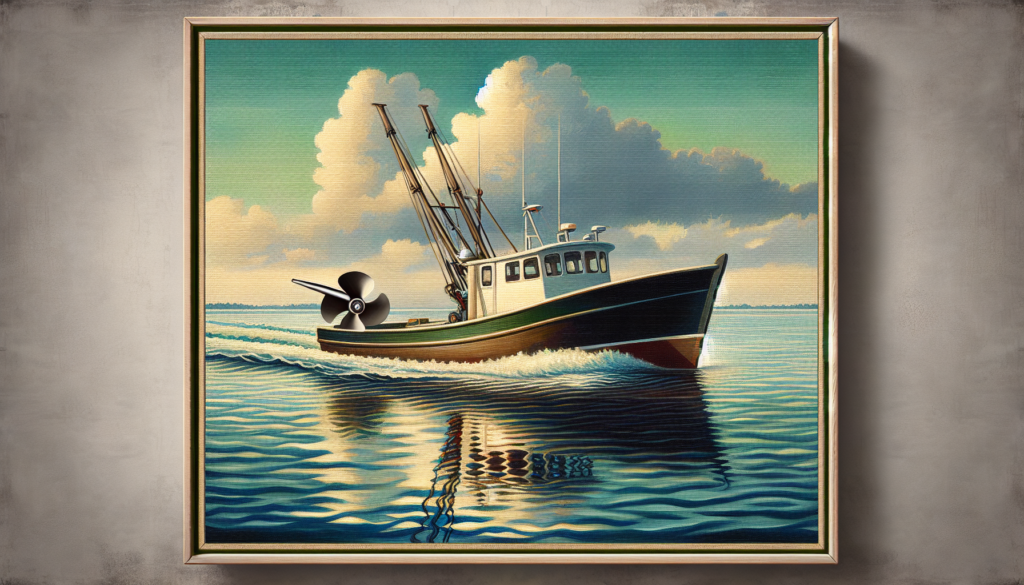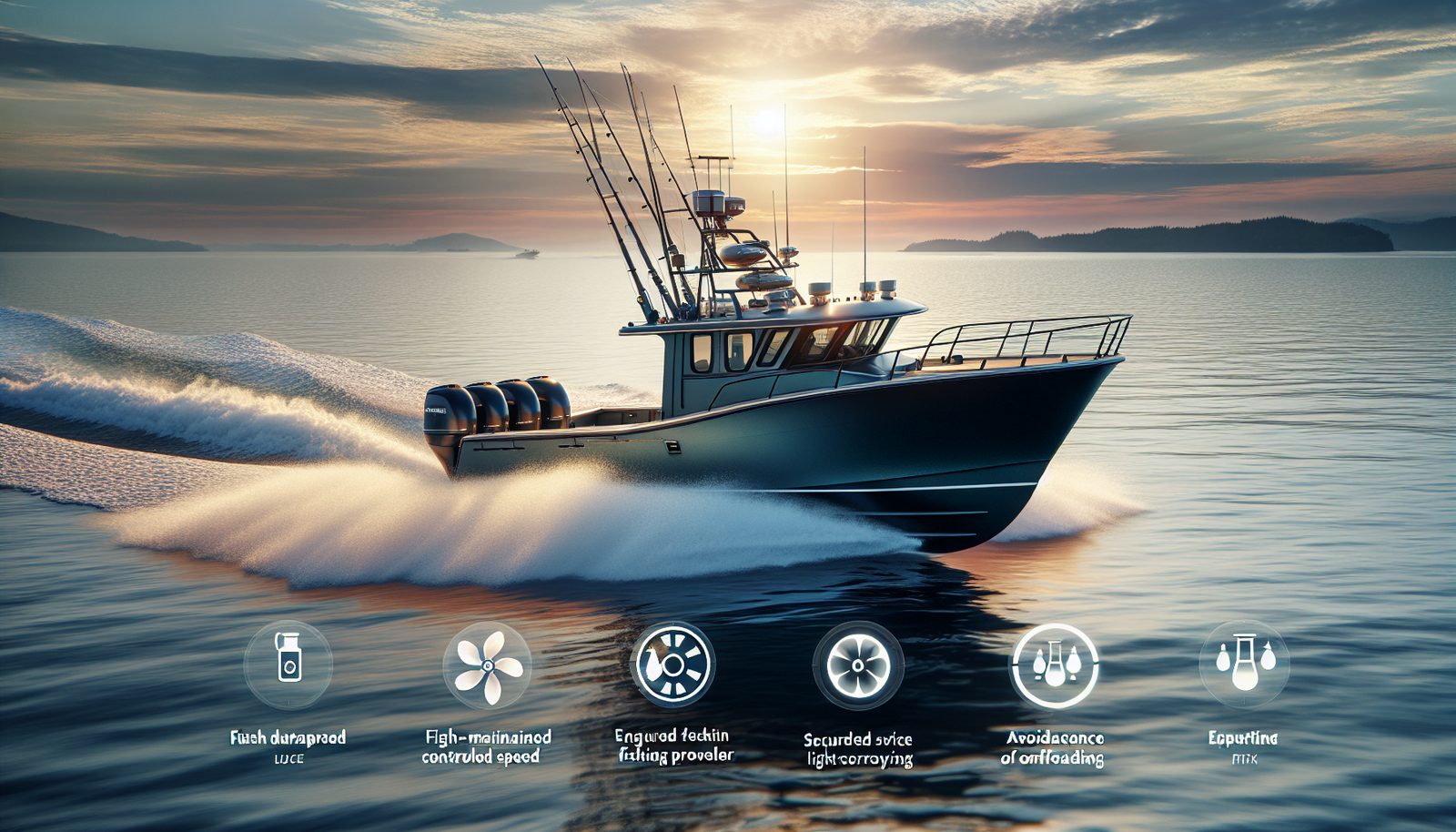Are you burning through too much fuel while you’re out fishing on your boat? Well, you’re on the right page. We’ve gathered the top 5 tips for improving fuel efficiency in Your Fishing Boat to help your adventures not only be fun and successful, but also cost-effective. From maintenance hacks to navigation tricks, these tips will have you spend less money on fuel, and more time enjoying the open water.
Understanding the Importance of Fuel Efficiency
Navigating through the marine waters, whether for leisure or for livelihood, requires a keen understanding of your boat’s fuel efficiency. This isn’t just about saving money, it stretches far beyond that.
Significance of fuel efficiency for boats
When you think about fuel efficiency, you’re not just considering the amount of fuel your boat uses per mile. Rather, you’re thinking about how optimally that fuel is used. A more fuel-efficient boat will navigate waters easily, with a smooth and constant speed. This reduces unnecessary strain on your boat’s engine which can lead to wear and tear.
Impacts of fuel inefficiency on environment and expenses
Beyond the borders of your boat, fuel inefficiency has negative implications for the environment. Fuel emissions contribute to air and water pollution which pose a threat to marine life. By maintaining fuel efficiency, you are playing a part in preserving the aquatic ecosystem. On the financial front, inefficient fuel usage can lead to skyrocketing operating costs which could impact your finances negatively.
Benefits of an efficiency-oriented fishing boat
A fuel-efficient boat offers numerous advantages. It extends the life of your vessel as excessive strain on the engine is reduced. It also decreases downtime due to maintenance and repairs. Moreover, you contribute to protecting the marine environment by reducing pollution.
Maintaining the Boat’s Engine for Optimal Efficiency
The heart of your boat’s fuel efficiency lies in its engine. Similar to how we take care of our hearts to maintain good health, a boat’s engine requires equal attention.
Regular check-ups and maintenance
Regular check-ups and timely maintenance of the engine translate to better fuel efficiency. Over time, even minor unaddressed issues can lead to significant problems affecting the engine’s performance, fuel consumption, and lifespan.
Understanding the role of a well-conditioned engine
An engine in optimal condition ensures maximum fuel efficiency and smooth operation. It prevents unnecessary speed fluctuations and stalls, thereby enhancing your nautical experience.
Optimizing engine usage: idling and speed control
Idling and unnecessary acceleration can lead to significant fuel wastage. By keeping a consistent speed and avoiding periods of idling, you can optimize fuel usage. Also, remember to turn your engine off when not in use.

Importance of Using Quality Fuel
Whichever type of fuel your boat uses, fuel quality can never be compromised.
Effects of using low-quality fuel
Low-quality fuel can lead to possible damage in your engine and fuel system. It can result in fuel leaks, improper combustion and increase likely wear and tear in the system. This can eventually result in frequent breakdowns and increased maintenance costs.
Choosing the right type of fuel for your boat
Always ensure you are using a type of fuel that is recommended for your boat. Different engines are designed to run on different types of fuels. Using an incompatible type of fuel may degrade your engine’s performance and increase fuel consumption.
Major benefits of using higher grade fuels
Using a higher grade fuel can enhance your boat’s performance, prolong the engine life, and increase fuel economy.
Proper Weight Distribution and its Effect on Fuel Efficiency
The distribution and amount of weight your boat carries can significantly impact its fuel efficiency.
Influence of weight on fuel economy
Overloading your boat can reduce its buoyancy and make the engine use more fuel to maintain the same speed. Keeping your boat light and evenly distributing the weight allows the engine to operate optimally.
Effective weight management techniques
Avoid carrying unnecessary weight on your boat. Make sure to keep weight evenly distributed across the boat’s length and breadth for smooth sailing. An overburdened stern or bow can significantly reduce fuel efficiency.
Avoiding unnecessary weight
By removing unnecessary items from the boat, you can reduce weight and increase fuel efficiency. Always plan your trips and carry only the essentials.

Optimizing Hull Condition and Shape
The condition and shape of your boat’s hull play a significant role in determining the boat’s fuel efficiency.
Understanding hull resistance and its impact on fuel efficiency
Hull resistance is the force working against a boat, slowing it down in water. The higher the hull resistance, the harder the engine will need to work, and thus, the more fuel it will consume.
Recommended practices to ensure optimal hull condition
To ensure your hull is in optimal condition, routine cleaning is crucial. This helps prevent the growth of aquatic organisms like algae and barnacles, which can increase drag and decrease fuel efficiency.
Impacts of fouling and its prevention
Fouling, the accumulation of unwanted materials on the hull, increases drag that can lead to an increase in fuel consumption. Implement a regular cleaning schedule to prevent fouling and maintain your hull in top condition.
Role of Propeller Condition in Fuel Efficiency
Just like the engine and hull, the propellers’ condition also has a direct impact on fuel efficiency.
Effects of a damaged or inefficient propeller
Damaged or inefficient propellers can create vibration, noise, and inhibit the boat’s performance by increasing drag and decreasing speed and fuel efficiency.
Maintaining your boat’s propeller for better efficiency
Regular check-ups and maintenance of your propeller are essential. Timely identification of damages like bends, chips, and corrosion can prolong your propeller’s life, enhancing the boat’s performance and fuel efficiency.
Choosing the right propeller
Choosing the right propeller for your boat can highly impact fuel efficiency. While selecting a propeller, consider factors like the size of your boat, the engine’s horsepower rating, load carrying capacity, and your primary usage of the boat.
Impact of Navigation and Routing on Fuel Consumption
Good navigational skills aren’t just about reaching your destination. They are a key factor in optimizing fuel usage.
Understanding weather impacts and sea conditions
Weather conditions and sea current can significantly impact fuel consumption. Sailing against strong winds or currents requires more power and therefore more fuel.
Using modern GPS tracking and routing software
Today, boaters have access to GPS tracking and routing software that can help plot the most fuel-efficient course based on sea conditions. Make use of these technologies to optimize your boat’s fuel efficiency.
Making strategic navigation decisions
Plan your routes strategically and make wise navigational decisions to reduce fuel consumption. Learn to read the weather and sea conditions, and adapt to best suit your boat.
Influence of Crew Behavior on Fuel Efficiency
The way the crew operates the boat can hugely affect fuel consumption.
How driving habits affect fuel consumption
Over speed, frequent braking and quick acceleration can increase fuel consumption. Encourage smooth and consistent driving for improved fuel efficiency.
Educating crew on energy-saving behaviors
Inculcate energy-saving habits in your crew like avoiding unnecessary idling, turning off non-essential electronics, and regularly checking for mechanical issues.
Importance of mindful operation of boat accessories
Teach the crew to be mindful when operating boat accessories. Every device on the boat consumes power, be it fishing equipment, navigational aids, or comfort utilities. Efficient usage of these devices can help save fuel.
Effect of Power Generation and Electronics on Fuel Efficiency
Boat electronics and power generation can be a major consuming factor, affecting your fuel efficiency.
Understanding the energy-demand of onboard electronics
Electronics on a boat can account for a significant portion of fuel usage. Understanding their energy needs can help optimize fuel efficiency.
Finding a balance between demand and generator operation
Running the generator continuously to power all boat electronics can prove to be fuel inefficiency. Learning to balance power demand and generator operation is key.
Exploring solar power and other alternatives
Equipping your boat with alternative energy solutions like solar power can decrease reliance on the fuel-driven generator, thus increasing fuel efficiency.
Monitoring and Improvement Strategies for Long Term Efficiency
Just like any other aspect of your boat, fuel efficiency needs to be consistently monitored and improved upon.
Implementing a regular fuel efficiency audit
Conducting regular fuel efficiency audits can help identify issues early on and mitigate them proactively. These audits can help identify patterns of fuel consumption and areas where improvements can be made.
Recognizing symptoms of reduced fuel efficiency
Being able to recognize symptoms of reduced fuel efficiency, like sudden changes in engine performance, can help in timely rectification of issues.
Making necessary upgrades and replacements
Sometimes, improving fuel efficiency may require upgrades or replacements of boat parts like engines, propellers or fuel systems. Don’t hesitate to invest in these upgrades as they may save you money in the long run.
In conclusion, optimizing your boat’s fuel efficiency doesn’t have to be daunting. With these practical tips and a little vigilance, you can boost fuel efficiency, save costs, and play your part in preserving our marine ecosystem.

